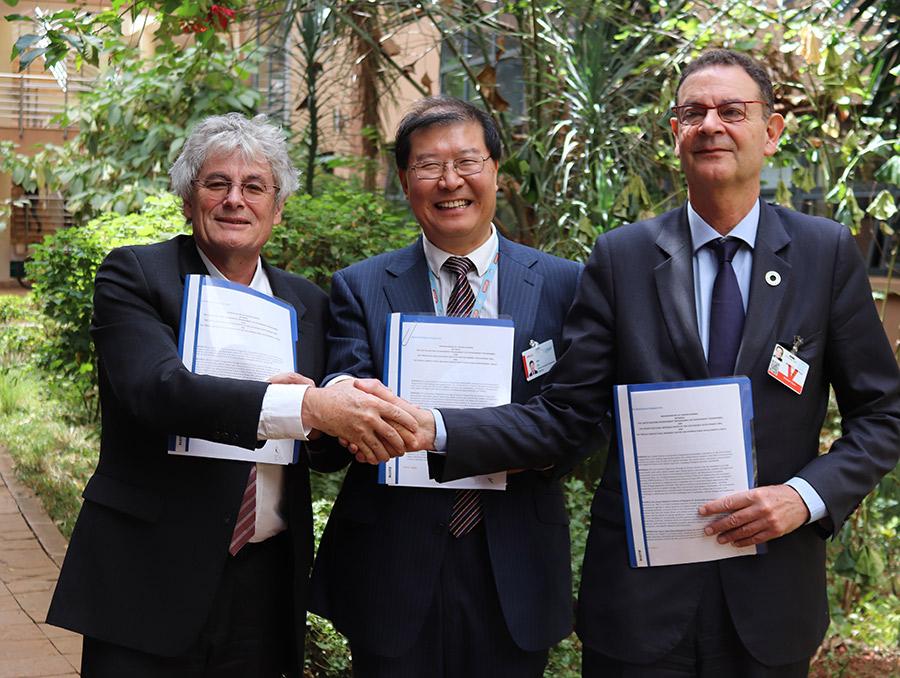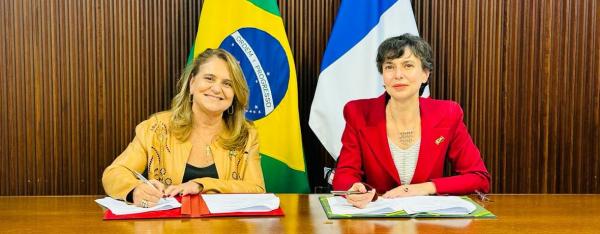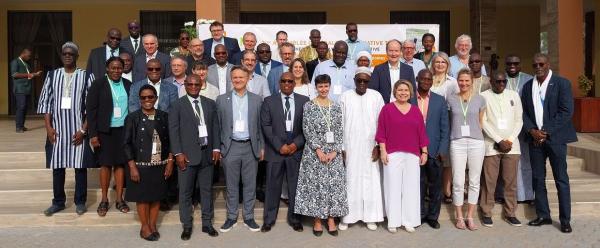Institutional news 3 April 2024
- Home
- Press area
- Press releases
- IRD Cirad PNUE Cooperation
Environment and sustainable development: IRD, CIRAD and UNEP sign a cooperation framework agreement

CIRAD President Managing Director Michel Eddi, UNEP Chief Scientist and Director of the Science Division Jian Liu, and IRD President Jean-Paul Moatti, at the signing of the framework agreement in Nairobi © IRD/Cécile Bégard
The third edition of the One Planet Summit was held as a side event to the fourth session of the United Nations Environment Assembly, from 11 to 15 March 2019. “The 6th Global Environment Outlook, published for this occasion, confirms that most indicators on ecosystems in the Sustainable Development Goals (SDGs) are deteriorating”, says Jean-Paul Moatti, CEO of IRD. “Bridging the gap between science and policy is now a matter of urgency for the world”, adds Michel Eddi, CEO of CIRAD.
It is in this context of international mobilisation for the climate that IRD, CIRAD and UNEP signed a framework agreement for scientific cooperation.
At the heart of this agreement: conservation, the protection of natural resources and the preservation of biological diversity, which are key challenges of the Sustainable Development Goals (SDGs).
The focus is therefore on five areas of cooperation:
- protecting marine and terrestrial biodiversity;
- understanding and managing climate risks;
- acquiring and managing environmental data;
- studying soil degradation and land restoration programmes;
- linkages between environment, society and health.
About CIRAD
CIRAD is the French Agricultural Research Centre for International Development, working for the sustainable development of tropical and Mediterranean regions. It works with its partners in developing countries and in the French overseas territories to generate and pass on new knowledge to support agricultural development. Through its research and training activities, it helps resolve issues at the heart of major global challenges: climate change, agro-ecological transition, preservation of biodiversity and health according to a "One Health" approach, development of rural territories and sustainable food systems.
About IRD
The French National Research Institute for Sustainable Development (IRD), an internationally recognised multidisciplinary organisation working primarily in partnership with Mediterranean and inter-tropical countries, is a French public establishment under the joint authority of the French Ministry of Higher Education and Research and the Ministry of Foreign Affairs and International Development.
Via its network and presence in fifty or so countries, it takes an original approach to research, expertise, training and knowledge-sharing, to the benefit of countries and regions that make science and innovation key drivers in their development.
About UNEP
The United Nations Environment Programme (UN Environment) is the leading global environmental authority that sets the global environmental agenda, promotes the coherent implementation of the environmental dimension of sustainable development within the United Nations system, and serves as an authoritative advocate for the global environment.
Our mission is to provide leadership and encourage partnership in caring for the environment by inspiring, informing, and enabling nations and peoples to improve their quality of life without compromising that of future generations.


























